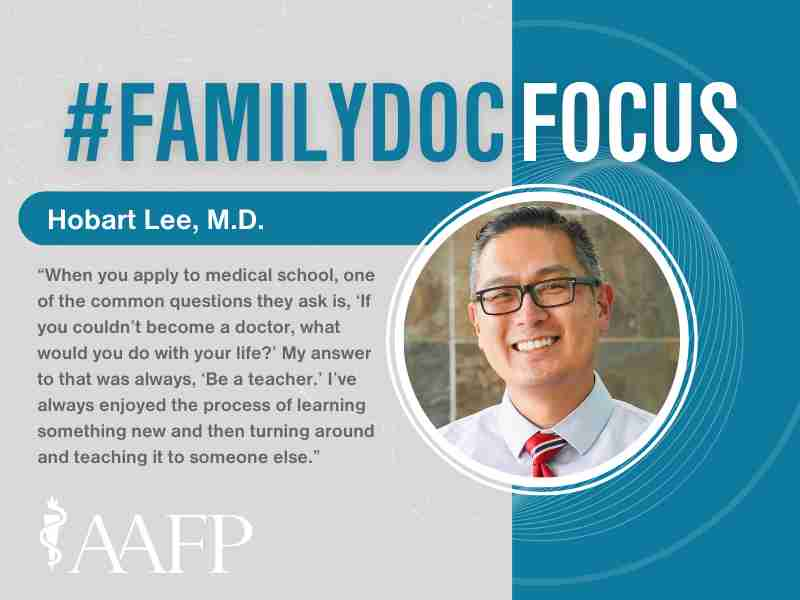Program Director Found Joy in Teaching
Dec. 8, 2022, 11:41 a.m. David Mitchell — Hobart Lee, M.D., loved his rotation at a hospital emergency department, and he was fascinated by surgery, too. Yet something was missing.

“What I found to be most frustrating about each rotation was that it didn’t really get to the heart of why I wanted to be a doctor,” said Lee, who has been the family medicine residency program director at Loma Linda University since 2013. “To me, the most important thing was that I wanted to know patients over time.”
A day after seeing a patient with appendicitis in the emergency room, Lee asked his attending what had happened to that patient. The physician responded that his role in the ER was focused on triage and initial management, not follow up.
“I realized I can’t just take care of a patient and let it go,” Lee said. “I’m curious. I want to know that the patient is OK. I didn’t feel like any other specialty really understood that or valued that until my family medicine clerkship.”
As a third-year medical student at the University of Pennsylvania’s Perelman School of Medicine, Lee saw a woman during her final prenatal checkup, attended her delivery, and also saw the woman and her baby during a newborn visit a few days later.
During that third meeting, Lee walked into the exam room, introduced himself as a medical student and asked if he could speak with her before the attending physician arrived.
“She interrupted me and said, ‘You don’t need to introduce yourself because I know who you are. You’re my doctor,’” Lee said. “I was like, wow, she remembers me.”
The patient was planning to travel to Argentina to see family and had numerous questions about flying with an infant. Lee didn’t know the answers, so he went to go find his preceptor.
“My preceptor looked at me and said, ‘You’re so happy. What’s with you?’” Lee said. “I said, ‘I’m seeing that patient who we got to deliver, and I get to see that newborn. I can’t tell you how different this conversation with the mom feels than the first time I saw her.’ My preceptor said, ‘That’s continuity. That’s what I get to do all day because I know my patients, and my patients know me.’ Something clicked in my head. That’s what had been missing for me in medicine.”
Years later, Lee remains uncertain whether seeing that same patient three times during a clerkship was coincidence or providence.
“All that lined up perfectly for me,” he said, “and it changed my life.”
Lee realized as a resident at the University of Michigan that he wanted to stay in academic medicine, so he continued his training with an academic faculty development fellowship at Michigan and followed that with the Association of Family Medicine Residency Directors’ National Institute for Program Director Development fellowship.
“When you apply to medical school, one of the common questions they ask is, ‘If you couldn’t become a doctor, what would you do with your life?’” said Lee, associate professor in the Department of Family Medicine at Loma Linda University School of Medicine. “My answer to that was always, ‘Be a teacher.’ I’ve always enjoyed the process of learning something new and then turning around and teaching it to someone else. Learning and growing is one of my core values, and it’s one of the reasons why I remained involved in education.”
Lee’s educational efforts aren’t limited to residents. He also enjoys teaching, and learning from, his peers. He’ll be one of the speakers March 3-5 during the Residency Leadership Summit in Kansas City, Mo.
“If you’re involved in resident education and you are looking for very practical, real-world solutions to your problems and you want to meet other residency faculty, RLS is your event,” he said. “If you’re a family medicine program director, RLS is the one conference you have to attend every year.”
The conference will feature a session about teaching compassionate care in residencies presented by Lee; University of North Carolina professor Stephen Crane, M.D., M.P.H.; and Mary Nordling, M.D., the program director of Oregon Health & Science University School of Medicine’s new program in Hillsboro, Ore.
“We recognize the issue of burnout and wellness are very important,” Lee said. “Program directors and residency programs should encourage residents to have compassion in the care that they deliver. Unfortunately, because of the challenges in residency, and especially coming out of the COVID pandemic, compassion fatigue is a real issue. I think a lot of people are struggling with that. If you ask doctors if compassion is important, of course, they will say, yes. But if you ask them, ‘How do you measure compassion?’ or ‘How do you teach compassion?’ those are harder to define.”
Lee has served as a consultant for the AAFP’s Residency Program Solutions since last year. RPS helps residency programs with a wide range of issues, including accreditation; faculty development; recruitment and retention; culture; and curriculum development. Consultants help new programs get started, programs struggling to meet certain requirements and even thriving programs that want to further excel.
Lee, who held leadership positions with the California AFP and in his health system, said he had been pondering what more he could do to give back to family medicine, including in areas of leadership and advocacy.
“But what I really enjoy most is the education piece, working with trainees and helping run my own program to make it the best it can be,” he said. “When RPS was looking for additional consultants, I thought this would be an interesting opportunity to share what I’ve learned as a program director to help residency programs and also to learn from the community of family medicine and the other RPS consultants.”